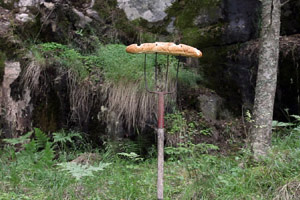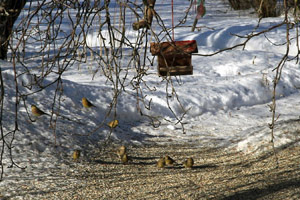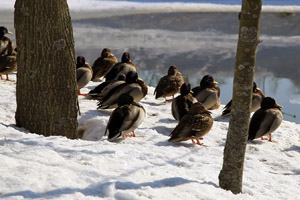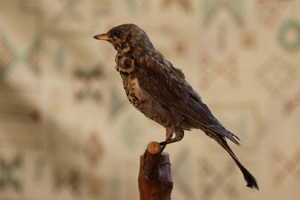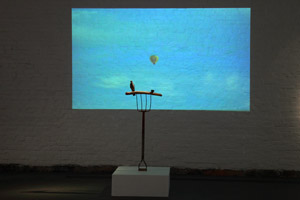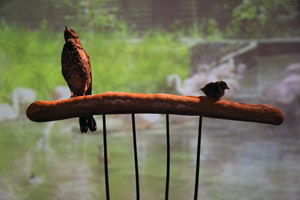Spectacle for Birds - Waste, Territory and Nutrition
Spectacle for Birds - Waste, Territory and Nutrition
Video DV PAL 16:9 30 min and two displays of objects, 2011
This artwork consists of a video and two displays of objects, one of which is located in Salo Art Museum and the other in a nature setting. The museum display is of a fork with its prongs stuck into a baguette which was retrieved from a rubbish bin in a Salo food store. Two small stuffed birds are fixed on top of the bread. The display in the nature setting is made up of the same basic elements but there are no stuffed birds; instead, the dry bread offers nourishment to the birds of the forest.
By situating the displays in these two different settings, it is clear to see how two different environments give different significance to the same items. The museum represents mans territory, where people try to control nature. There, the fork loses its usefulness and becomes a purely aesthetic object. The baguette it has been stuck into dries out, loses its nutritional value and becomes refuse. In this internal space, real live birds are represented by stuffed ones, which are frozen in time and become appropriated by man for aesthetic and scientific observation. In the nature setting, the fork represents the seizure of space and the takeover of nature a kind of relic of the Neolithic revolution, or an example of present-day bio-colonialism. Similarly, the dried baguette which has become inedible for humans has turned into nourishment that the birds of the forest can eat in peace without human interference. We are in their territory and must respect them.
In the museum there is also a video which clearly shows the overlap of territories and the contest between humans and birds for supremacy, as well as the human tendency to create new technologies to keep the unwanted in this case, birds at bay, while on the other hand associating them with mythology and psychological concepts such as freedom, the soul, and migration. Without birds, our conception of these ideas would be very different, perhaps even incomplete; because that which is easy for birds is for us impossible unless we can overcome the problem technologically.
